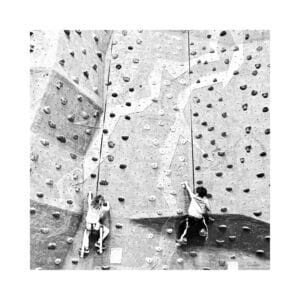So far, the series on play and approaching parenting with playfulness has emphasized three key points:
- Play requires trust and a sense of physiological and psychological safety.
- Play is about exploring possibilities.
- Play facilitates learning both during the exploration itself and also outside of it. Therefore, play is considered THE portal to neuroplasticity – the brain’s ability to change.
Today, I want to share with you an experience that blew my mind, taught me life lessons, and shed light on how these three qualities affect playfulness in general and parenting with playfulness in particular.
Ready? Let’s go.
Step back in time and into the studio
Four years ago I took an art-journaling class in which I got a simple, yet powerful, assignment.
The teacher told us to “create something ugly”.
I can’t express in words the excitement I felt hearing her. However, I remember that the word freedom came to mind.
“I can do ugly”, I thought to myself. “It’s easy”.
Thoughts kept running in my head. I was looking around the studio. Scanning for materials that would make the creation ugly.
My eyes landed on the washi tapes (masking tape made of rice paper). There were about 50-60 of them on the stand, in different colors, patterns, and sizes. The combination of them seemed cluttered. “They would make my piece ugly”, I thought and immediately grabbed them all.
I opened my journal, reviewed the empty pages I had left, and found a page that was torn and messy.
“Yes! That’s ugly. Ok, let’s do it.” I felt thrilled.
I took one washi tape, cut it, and pasted it.
I didn’t mind the length, color, or pattern the washi tape had on it. I was not trying to match things or to create harmony. I felt free to just take them one by one and randomly fill the page with them.
Then, I noticed a picture of me popping out of my journal. I used it in the previous week’s assignment.
“Great! I can print it on the page, I thought”. I used some ink to freely and carelessly draw lines on the picture to make it crazily ugly.
It was so much fun! Again, I didn’t mind if it looked good, if the lines were clear, or how it’d turn out once I printed it.
Then, within seconds, I turned over the picture and put the inked side on the page, printing my profile onto the page. I was in flow.
I kept on going, drew crazy hair, added some dots and patterns, and without blinking wrote “UGLY BUT FREE”.
I felt complete.
I stared at my “ugly” piece with pure joy.
I loved it so much.
The vibrant colors and the liveliness that this piece radiated filled my heart.
I loved sensing refreshing energy flowing in my body. I remember thinking “this is how freedom feels like”. I wanted to stay present in the moment and take in all the goodness: the energy, the novelty, the freedom to express myself without the pressure of creating a “masterpiece”.
Then, the teacher’s voice woke me up from my daydream.
She asked the other participants whether they thought their work was ugly or not. They all shook their heads.
Other participants, like me, used materials, color combinations, and techniques, which they didn’t like or hadn’t used before. They, like me, felt free to explore and thought it surely would make the piece ugly. Also, like me, they admitted that their “ugly” creation is the most expressive and vibrant creation they have ever made.
This hands-on experience stayed with me ever since.
However, now, when I reflect on this experience through the lens of cultivating play, I understand the power of the environment. When my trusted teacher asked to create something ugly, she created psychological safety. In just three words, she moved the focus away from the outcome of the masterpiece. That set the stage for pure exploration that allowed us to learn about ourselves during the playful assignment and after.
Applying the lessons learned on the parenting journey
In that experience, which represents a point in time during my art journey, I was a learner. I was able to explore, play, be creative, engage deeply, and learn because I felt safe. That safety was created when fear and stress were taken away from the outcome. I’ve never imagined that approaching a task with carelessness or mediocracy could generate an outcome that I’d enjoy working on, feel proud of, learn meaningful lessons, and actually love.
In my parenting journey, I’m a learner too. However, I don’t feel safe exploring. Fears of doing things wrong, fears of failing to become a trusted adult in my kids’ lives, and limiting beliefs create a high stake condition in which I don’t feel safe to approach parenting with playfulness.
For example, when my kid doesn’t want to practice reading, I interpret his refusal as a potential threat to his future. As his mom, I want to contribute to his life. The only way I know to make progress in reading is by practicing reading. This is the “efficient” and “right” way. So when I hear his refusal, coupled with knowing the school expectations, I don’t feel safe exploring and approaching parenting with playfulness. In that environment, a fixed mindset rules over and plays a script: only if I see him reading he will improve and I can feel safe again.
But when I regulate my fears, detach from the school expectation and my expectation to see him practice in a certain way, as well as when I connect with my deep values – to educate with connection and free will – I’m able to create safety, activate my growth mindset and step into a mode of exploration.
In that mode of exploration, I’m able to acknowledge that the “right” ways that worked for me represent only some possibilities. There are many more possibilities to explore together like reading recipes while we bake, reading guidelines as we work on an engineering project, or reading about his favorite animals.
In a way, I did what my art teacher did: creating psychological safety that allowed exploration to flourish.
Approaching parenting with playfulness and cultivating playfulness at home takes various skills, including emotional intelligence (like regulating fears and regaining a sense of safety), optimism (like developing trust and faith in the process), mindfulness (like detaching from the outcome), and more.
However, it is worth the effort. Approaching parenting with playfulness allows us to engage in exploration, express ourselves, enjoy the discoveries, nurture the connection with ourselves and our loved ones, and celebrate the role models we become. These experiences fill the parenting journey with fulfillment and satisfaction.
The added benefit? These skills help us to move from a fixed mindset toward a growth mindset.
That’s the wonderful and greatest potential of play.


